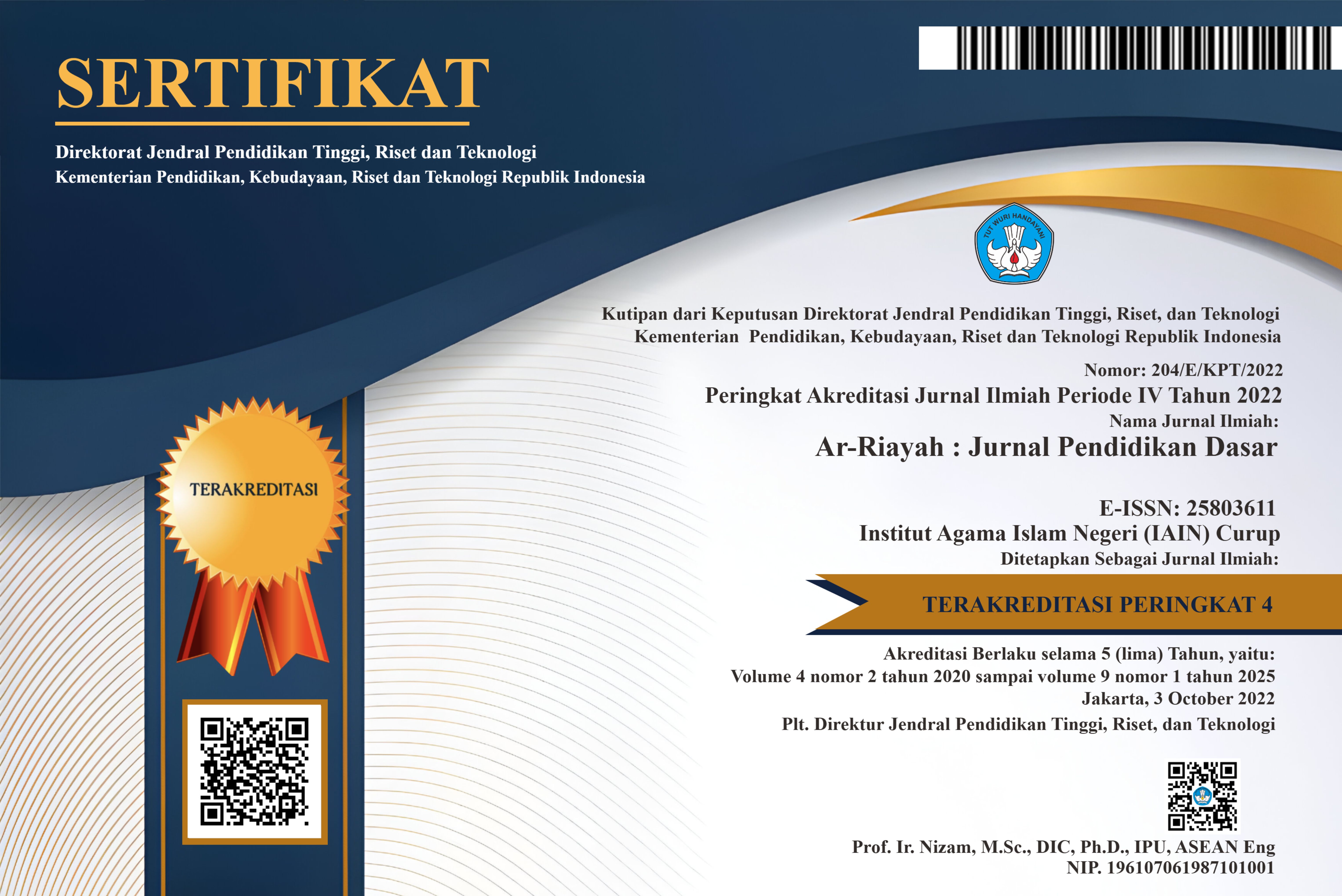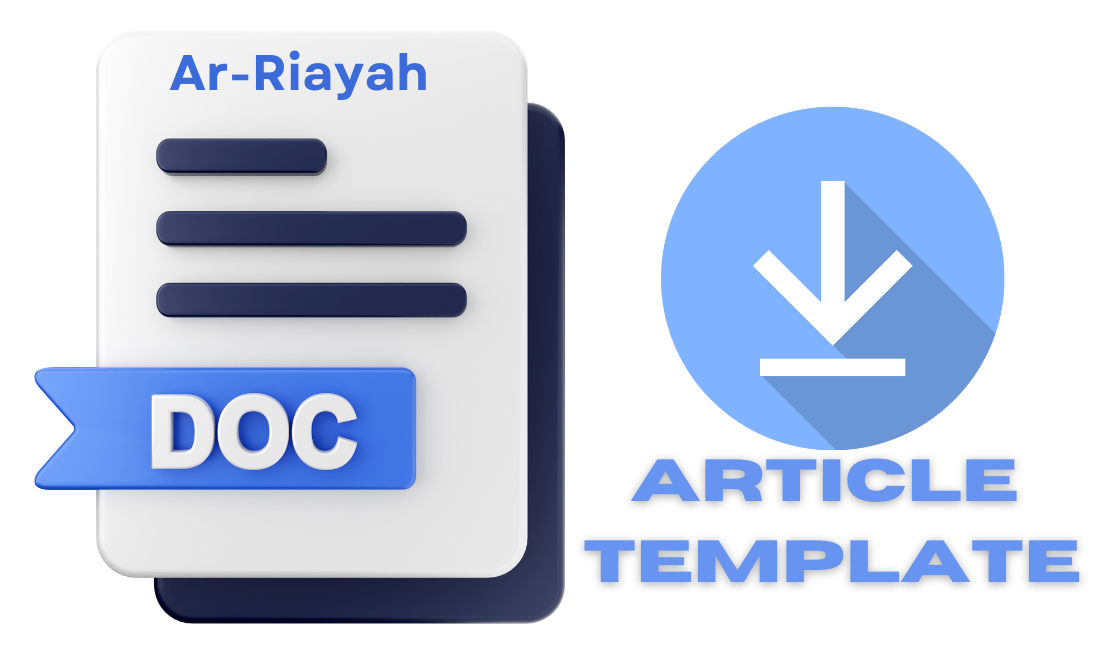Pembelajaran Matematika Sekolah Dasar: Antara Kepercayaan Vs Realita
DOI:
https://doi.org/10.29240/jpd.v6i1.4034Keywords:
Myth, Mathematics learningAbstract
Mathematical myths/beliefs are mental representations or views held by an individual towards mathematics, which may be constructed as a result of social experience, mediated through school, parents, peers or mass media. The purpose of this research is to examine the myths that exist and are believed by people or someone who has been the object of learning mathematics. The research method used in this research is library research/library research. To achieve this goal, this research article is supported by various literatures sourced from journals or scientific articles that discuss topics with keywords: mathematical problems, difficulty analysis, as well as journals that have criteria such as; published in the last five years, and is already indexed. Searching for reference sources resulted in 42 journals or articles consisting of 16 international articles, 28 national journals, and 4 printed books. which is difficult, 3) mathematics is about numbers and abstract objects, 4) mathematics is about right or wrong, 5) learning mathematics is terror anxiety/fear, and 6) math is the same as brain processing.
Downloads
References
Alfarisi, Alyza Satria, Farras Astri Firdayani, Anita Ayu Safitri, Fifin Ariyanti, and Arga Bagus Handi Pradana. “Mitos Dan Budaya Kaapunan Masyarakat Gantung, Belitung Timur Di Masyarakat Global-Multikultural.†Buletin KKN Pendidikan 1, no. 1 (2019): 18–22.
Alsubaie, Merfat Ayesh. “Hidden Curriculum as One of Current Issue of Curriculum.†Journal of Education and Practice 6, no. 33 (2015): 125–128.
Arnidha, Yunni, and Fatahillah. “Membentuk Karakter Logis, Kritis, Kreatif Dan Inovatif Dalam Pembelajaran Matematika Melalui Pendekatan Saintifik.†Jurnal e-DuMath 7, no. 1 (2021): 35–41.
AULIYA, RISMA NURUL. “Kecemasan Matematika Dan Pemahaman Matematis.†Jurnal Formatif 6, no. 1 (2016): 12–22.
Awofala, Adeneye O. A., and Omotayo Ojaleye. “An Exploration of Preservice Teachers’ Educational Values of Mathematics in Relation to Gender and Attitudes toward Mathematics in Nigeria.†Journal of Pedagogical Research 2, no. 1 (2018): 1–15.
Ayob, A., and R.M. Yasin. “Factors Affecting Attitudes Toward Mathematics.†International Journal of Academic Reserch in Business and Social Sciences 7, no. 11 (2017): 1100–1109.
Bishop, A. J. “Critical Issues in Researching Cultural Aspects of Mathematics Education.†In Paperpresented in Discussion Group 2 at the 10th International Congress on Mathematical Education, 4–11, 2004.
Bishop, A. J. “What Values Do You Teach When You Teach Mathematics?†Teaching Children Mathematics 7, no. 6 (2001): 346–349.
Brown, Jennifer, Roberto Soto-Varela, and Myriam Esther Ortiz-Padilla. “Does Mathematical Anxiety Differ Cross-Clturally?†Journal of New Approaches in Educational Researc 9, no. 1 (2020): 126–146.
Cahyani, Hesti, and Ririn Wahyu Setyawati. “Pentingnya Peningkatan Kemampuan Pemecahan Masalah Melalui PBL Untuk Mempersiapkan Generasi Unggul Menghadapi MEA.†In Seminar Nasional Matematika X, 151–160. Semarang: Universitas Negeri Semarang, 2016.
Cascio, Wayne F., and ‎Herman Aguinis. Applied Psychology in Talent Management. Eighth. Thousands Oak, California: Sage Publivations, Inc., 2018.
Cvencek, Dario, Andrew N. Meltzoff, Ruzica Brecic, and Dora Gacesa. “Development of Math Attitudes and Math Self-Concepts: Gender Differences, Implicit–Explicit Dissociations, and Relations to Math Achievement.†Child Development, 00, no. 0 (2021): 1–17.
Darling-Hammond, Linda, Lisa Flook, Channa Cook-Harvey, Brigid Barron, and David Osher. “Implications for Educational Practice of the Science of Learning and Development.†Applied Developmental Science 24, no. 2 (2020): 97–140.
Davis, Ernest Kofi, Wee Tiong Seah, and Nathaniel Howard. “The Attributes of Mathematics Learning Which Ghanaian Senior High School Students Value.†Journal of Global Education and Research 5, no. 1 (2021): 1–14.
Dewi, Putri Sukma. “Efektivitas Pendekatan Open Ended Ditinjau Dari Kemampuan Pemecahan Masalah Matematis.†PRISMA 7, no. 1 (2018): 11–19.
Fried, Michael N. “Mathematics as the Science of Patterns - Mathematics as the Science of Patterns.†MAA Publication. Last modified 2010. https://www.maa.org/press/periodicals/convergence/mathematics-as-the-science-of-patterns-mathematics-as-the-science-of-patterns.
GarcÃa-Santillán, A., Valeria MartÃnez-RodrÃguez, and Josefina C. Santana. “Psychometric Properties of the RMARS Scale in High School Students.â€.†European Journal of Contemporary Education 7 (2018): 97–117.
Gazali, R.Y. “Pembelajaran Matematika Yang Bermakna.†Math Didactic: Jurnal Pendidikan Matematik 2, no. 3 (2016).
Hasratuddin. “Pembelajaran Matematika Sekarang Dan Yang Akan Datang Berbasis Karakter.†Jurnal Didaktik Matematika 1, no. 2 (2014): 30–42.
Herawati. “Memahami Proses Belajar Anak.†Jurnal Bunayya: Jurnal Pendidikan Anak 4, no. 1 (2018): 28–48.
Hidajat, Djatmiko, Diah Arum Pratiwi, and Afif Afghohani. “ANALISIS KESULITAN DALAM PENYELESAIAN PERMASALAHAN RUANG DIMENSI DUA.†Jurnal Pendidikan Matematika 1, no. 1 (2018): 1–16.
Hoque, Md. Enamul. “Three Domains of Learning: Cognitive, Affective and Psychomotor.†The Journal of EFL Education and Research (JEFLER) 2, no. 2 (2016): 45–52.
Intan, Paramita, and Ika Kurniasari. “Cognitive Function of Junior Junior School Students in Solving Geometry Problems Based On Verbalizer and Visualizer Cognitive Style.†Jurnal Penelitian Pendidikan Matematika dan Sains 5, no. 1 (2021): 1–9.
Izzah, K. H., and M Azizah. “Analisis Kemampuan Penalaran Siswa Dalam Pemecahan Masalah Matematika Siswa Kelas IV.†Indonesian Journal Of Educational Research and Review 2, no. 2 (2019).
Kurniasih, Nurafni Retno, and Idris Harta. “Analisis Kemampuan Kognitif Matematika Berdasarkan Task Commitment Siswa Kelas Khusus Olahraga Sekolah Menengah Atas.†Jurnal Riset Pendidikan Matematika 6, no. 1 (2019): 14–26.
Lim, C. S., and P Ernest. “A Survey of Public Images of Mathematics.†In BritishSociety for Research into Learning Mathematics., 1998.
Marhamah. “Belajar Matematika Melalui Permainan Matematika.†In Seminar Nasional 21 Universitas PGRI Palembang, 406–409. Sumatera Selatan, Palembang, 2018.
Morgan, Deborah Catherine. “Developing Primary Teachers’ Mathematics Subject Knowledge: A Practitioner Research Study That Explores the Developed Nature of Primary Teachers’ Subject Knowledge in Mathematics; the Factors Which Influenced Its Development and Its Interrelations.†EdD thesis The Open University, 2016.
Murayama, Kou, Reinhard Pekrun, Stephanie Lichtenfeld, and Rudolf vom Hofe. “Predicting Long-Term Growth in Students’ Mathematics Achievement: The Unique Contributions of Motivation and Cognitive Strategies.†Journal Child Development 84, no. 4 (2012).
Nuari, N. A. “Analisis Perilaku Pencegahan Child Sexual Abuse Oleh Orang Tua Pada Anak Usia Sekolah.†Jurnal Ilmu Kesehatan. 5, no. 1 (2017): 1–8.
O’Leary, Krystle, Cheryll L. Fitzpatrick, and Darcy Hallett. “Math Anxiety Is Related to Some, but Not All, Experiences with Math.†Front Psychol 8, no. Article 2067 (2017).
———. “Math Anxiety Is Related to Some, but Not All, Experiences with Math.†Frontiers in Psychology 8 (2017): 2067.
Puspitarini, Yanuari Dwi, and Muhammad Hanif. “Using Learning Media to Increase Learning Motivation in Elementary School.†Anatolian Journal of Education 4, no. 2 (2019): 53–60.
Santoso, H.B., and Subagyo. “Peningkatan Aktifitas Dan Hasil Belajar Dengan Metode Problem Basic Learning (PBL) Pada Mata Pelajaran Tune Up Motor Bensin Siswa Kelas XI Di SMK Insan Cendekia Turi Sleman.†Jurnal Taman Vokasi 5, no. 1 (2017): 40–45.
Saputra, Paulus Roy. “Kecemasan Matematika Dan Cara Menguranginya (Mathematic Anxiety And How To Reduce It).†Jurnal Pythagoras 3, no. 2 (2014): 75–84.
Seah, W. T., A. J. Bishop, G. E. FitzSimons, and Clarkson P. C. “Exploring Issues of Control over Valuesteaching in the Mathematics Classroom.†In Annual Conference of the AustralianAssociation for Research in Education. Fremantle: Australia, 2001.
Siagian, M.D. “Kemampuan Koneksi Matematik Dalam Pembelajaran Matematika.†MES (Journal of Mathematics Education and Science) 2, no. 1 (2016): 58–67.
Simorangkir, Melda Rumia Rosmery, Risma Uly Manalu, and N. Masta. “Prediction and Analysis of Mathematics Anxiety Disorders in Adolescents During the Pandemic.†Solid State Technology 64, no. 2 (2021): 3042–3049.
Supekar, K., T. Iuculano, L. Chen, and V. Menon. “Remediation of Childhood Math Anxiety and Associated Neural Circuits through Cognitive Tutoring.†J. Neurosci 65 (2015): 12574–12583.
Syaf, Agus Hikmat, Iyon Maryono, and Juariah. “Upaya Meningkatkan Kemampuan Pemecahan Masalah Matematika Siswa Dalam Belajar Matematika Melalui Metode Demonstrasi Pada Materi Pokok Bangun Datar.†Jurnal Analisa 1, no. 2 (2018): 87–96.
Trisnani, Novy. “Tingkat Kemampuan Berpikir Reflektif Siswa Sekolah Dasar Kelas Tinggi.†AR-RIAYAH : Jurnal Pendidikan Dasar 4, no. 2 (2020): 131–144.
Usher, E. L., and F Pajares. “Sources of Self-Efficacy in Mathematics: A Validation Study.†Contemporary Educational Psychology 34, no. 1 (2009): 89–101.
Wahyudi, H. Suyitno, and B Waluya. “Dampak Perubahan Paradigma Baru Matematika Terhadap Kurikulum Dan Pembelajaran Matematika Di Indonesia.†Inopendas Jurnal Ilmiah Kependidikan 1, no. 1 (2018): 38–47.
Yadaf, Sunita, and Dr M. “Role Of Mathematics In The Development Of Society.†International Journal of Research and Analytical Reviews (IJRAR) 6, no. 4 (2020): 296–298.
Yuniatun, Tri, and Fariz Setyawan. “Analysis Of The Difficulty Of Students ’Mathematics Learning In Class Viii Function Materials.†AdMathEduSt 7, no. 1 (2020): 104–111.
Zakaria, E., and N.M. Nordin. “The Effects of Mathematics Anxiety on Matriculation Students as Related to Motivation and Achievement.†Journal of Mathematics, Science & Technology Education 4, no. 1 (2008): 27–30.
Downloads
Published
How to Cite
Issue
Section
Citation Check
License
Authors who publish with Ar-Riayah: Jurnal Pendidikan Dasar agree to the following terms:
Authors retain copyright and grant the journal right of first publication with the work simultaneously licensed under a Creative Commons Attribution-NonCommercial-ShareAlike 4.0 International License (CC BY-NC-SA 4.0) that allows others to share the work with an acknowledgment of the work's authorship and initial publication in this journal.
Authors are able to enter into separate, additional contractual arrangements for the non-exclusive distribution of the journal's published version of the work (e.g., post it to an institutional repository or publish it in a book), with an acknowledgment of its initial publication in this journal.
- Authors are permitted and encouraged to post their work online (e.g., in institutional repositories or on their website) prior to and during the submission process, as it can lead to productive exchanges, as well as earlier and greater citation of published work (See The Effect of Open Access).










